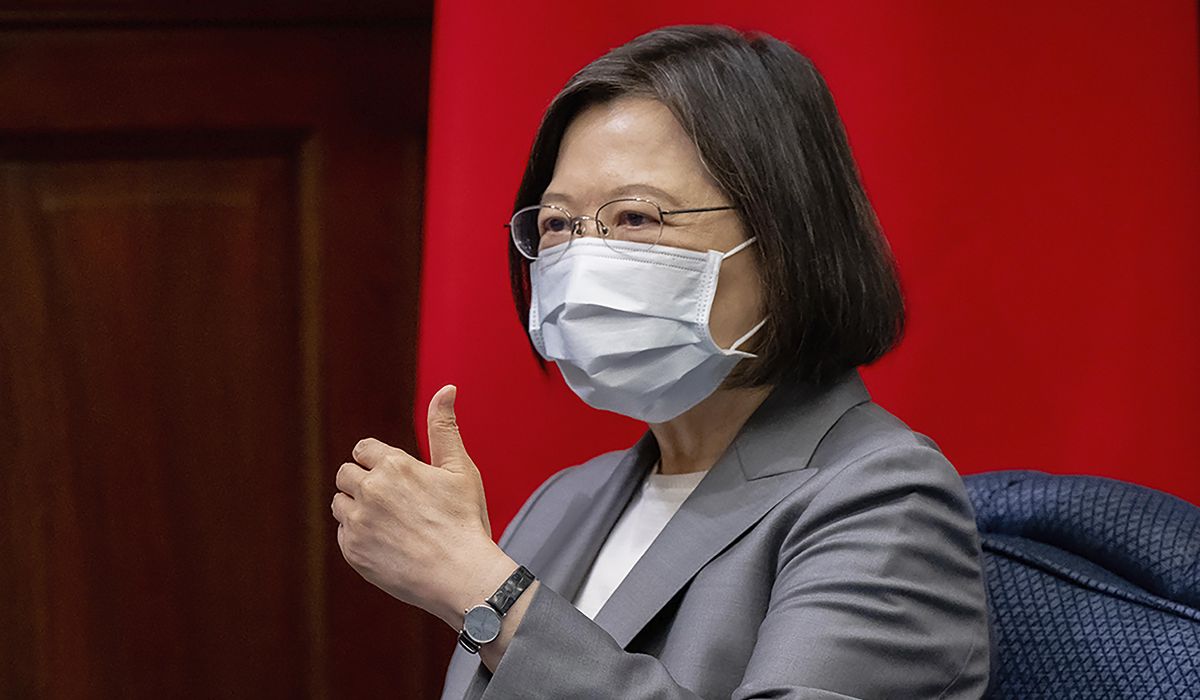
Taiwan‘s top diplomat in Washington said Taipei is in talks with the Biden administration on a variety of ways to counter Chinese “coercion,” but for now the island democracy is not calling publicly for more U.S. sanctions to counter Beijing’s increased aggression.
“We are exploring different policy tools to respond to China‘s threats,” said Hsiao Bi-khim, Taiwan‘s de facto ambassador to the United States, who pointed to Beijing’s recent expansion of military provocations toward Taiwan, as well as “cyberattacks” and “economic coercion.”
“What we’re facing at the moment are gray-zone attentions and coercion,” Ms. Hsiao told reporters at the U.S. Capitol on Wednesday evening. Her goal, she said, is to work with democracy-minded allies “to find means of strengthening Taiwan‘s economic security.”
Her comments came as a Taiwanese trade delegation inked a $3.2 billion in new deals with U.S. agriculture associations Tuesday, and as the Senate Foreign Relations Committee quickly approved a bill that calls for billions of dollars in new funding to bolster Taiwan‘s ability to resist Chinese military intimidation, a bill that China‘s Communist regime has sharply criticized.
Chinese officials on Thursday denounced the Senate bill, which includes language that would pressure the White House to level broad economic sanctions against Beijing in the event that China increases its military hostilities across the Taiwan Strait.
The sanctions issue has been a prickly one for the Biden administration, which has appeared wary of using the tactic out of concern that it may provoke retaliation from Beijing.
Chinese President Xi Jinping, who is expected to secure a third, five-year leadership term at next month’s Chinese Communist Party congress in Beijing, has expressed determination to bring Taiwan under Beijing’s control and not ruled out the use of military force to make it happen.
The Biden administration criticized the expansion of Chinese military drills and ballistic missile tests near Taiwan following House Speaker Nancy Pelosi’s visit to the island last month, accusing Beijing of “overreacting.”
But the White House has made it clear Mr. Biden is committed to the so-called “One China” policy, under which the U.S. has long acknowledged Beijing’s position that Taiwan is part of China — even as Washington maintains informal relations and substantial defense ties with the democratic government in Taiwan.
But Mr. Biden has made repeated comments that have muddied the traditional U.S. policy of “strategic ambiguity” toward the defense of Taiwan — leaving it open whether U.S. forces would respond militarily if the island were attacked by China.
Following the Senate’s advance Wednesday of the Taiwan legislation, Chinese Foreign Ministry spokeswoman Mao Ning told reporters in Beijing that China had “lodged serious complaints” with Washington. The measure still needs House and President Biden’s approval to become law.
“There is only one China in the world and Taiwan is an inalienable part of…China’s territory,” she said. “…If the bill continues to be deliberated, pushed forward or even signed into law, it will … cause extremely serious consequences to China-U.S. relations and peace and stability across the Taiwan Strait.”
Gathering of allies
The back and forth comes as officials from various democratic governments around the world gathered this week in Washington for a meeting of the Inter-Parliamentary Alliance on China (IPAC), which is reportedly drafting a document calling for more aggressive international deterrence against Chinese military and other coercive actions toward Taiwan.
“Economic and political measures, including meaningful sanctions, should be considered to deter military escalation, and to ensure trade and other exchanges with Taiwan can continue unimpeded,” the document states, according to a draft reviewed early in the week by Reuters.
The news agency also reported that Ms. Hsiao hosted dozens of international lawmakers involved in IPAC on Tuesday at Taiwan‘s sprawling “Twin Oaks” diplomatic mansion in Washington, where she told the group — including officials from Australia, Britain, Canada, India, Japan, Lithuania, the Netherlands, New Zealand and Ukraine — that “it is important to demonstrate to the bully that we have friends too.”
“We are not seeking to provoke the bully, but neither will we bow to their pressure,” she reportedly said.
When pressed on Wednesday evening whether she advocates U.S. sanctions against China, Ms. Hsiao told The Washington Times: “I don’t want to talk about a worst-case scenario — a hypothetical circumstance — but what we’re facing at the moment are gray-zone attentions and coercion, and our formula for the present state of relations, whether it’s across the Strait or on a global level, is to find means of strengthening Taiwan‘s economic security.”
She added that “we haven’t discussed any specifics” on sanctions with the Biden administration.
“We talk about integrated deterrence in a broader sense of the need to explore different tools to ensure that the status quo in the Taiwan Strait can be maintained,” she said.
“This is a conversation in the context of broader deterrence, and the Pentagon has coined the phrase ‘integrated deterrence,’ and economic issues — not kinetic means of deterring aggression — of course is part of the broader context of discussing deterrence,” Ms. Hsaio said.
“Unfortunately,” she added, “the current trajectory is that we expect such gray zone threats to continue. But I think current actions of China [are] also generating tremendous international awareness and concern over the situation and it is clear that we are not alone in terms of asserting that maintaining the status quo [of] peace and stability in the region is of critical interest.”
